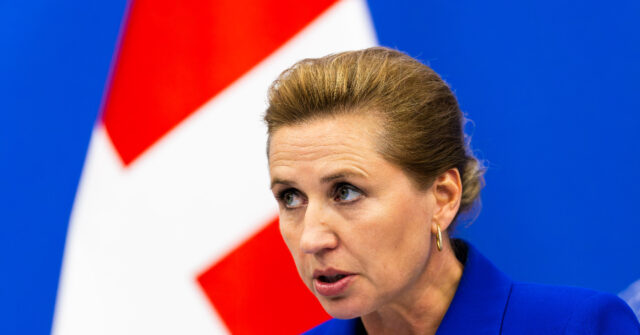Danish Prime Minister Mette Frederiksen addressed EU Parliamentarians to stress that the European project can only work if national distinctions and borders are respected, arguing that the mass migration agenda over the past decade has hurt the most disadvantaged people in European societies.
Prime Minister Frederiksen, who is charting a new course in the EU as an anti-mass migration leader of a left-wing Social Democrat party, defended her country’s third-way approach to governance in a speech at the European Parliament in Strasbourg on Tuesday.
Marking the start of Denmark’s control of the rotating presidency of the Council of the European Union, Frederiksen stated that while she believes in the EU project, she is not willing to forsake her country’s national identity or the protection of its borders for the sake of international cooperation.
“For me, there is only one way forward, and that is Europe. Europe, Europe, Europe,” she declared, but added, “I would like to make it very clear that my prerequisite for being able to say Europe is that I am very proud of my fatherland.”
“I am Danish before I am anything else,” Frederiksen said.
The Danish PM did lay out some red meat for progressives during her speech, including on the need for funding the Ukraine war and the green agenda. However, she also explained why, as a progressive, she believes in strong borders.
While she noted that her line differs with other Social Democrats in Strasbourg, she said: “It is precisely because I am a Social Democrat that I believe in and fight for a tight immigration policy because the people who pay the price of high crime levels in European cities and the insecurity that this uncontrolled migration has contributed are the European people who are most disadvantaged.”
Migration is “challenging Europe, affecting people’s lives, and the cohesion of our societies,” she said. “European citizens have a right to feel secure in their own countries, that is why we need to strengthen our external borders, lower the influx of migrants to Europe, we need to help stabilise Europe’s neighbouring countries, and make the process of returns easier and more efficient.”
Frederiksen and others in Denmark have also long argued that limiting immigration is essential to protecting the viability of the country’s large welfare state.
“What has been mainstream among our populations for quite many years is now mainstream for many of us politicians as well, finally… maybe not in the [European] Parliament, but gladly, and I’m really happy about that, at the European Council.”
During her address, Frederiksen quipped several times about how her novel policy approach drew either applause from the left or the right, depending on the topic.
Despite coming from differing ends of the political spectrum, the Danish PM has partnered with figures such as Italy’s Giorgia Meloni in pushing for the EU to adopt Rome’s plan of using third-party countries to house illegal migrants rather than allowing them to stay in Europe while their asylum claims are processed.
Denmark has also served as inspiration for other anti-mass migration populists in Europe, such as Geert Wilders in the Netherlands, who has backed calls for the Dutch to receive a similar “opt out” of EU immigration policy that Denmark secured in the early 1990s.
Given that Brussels’ diktats on immigration do not bind Denmark, Copenhagen has been able to enact much stricter requirements, particularly on issues such as chain migration and the return of refugees.
Indeed, a 2020 survey of 56 nations by the Migration Policy Index found that Denmark had the strictest family reunification requirements and the fourth lowest rate of allowing permanent residence for refugees, only trailing Saudi Arabia, the United Arab Emirates, and Jordan.
Denmark has also been a leader in publishing in-depth crime statistics, including the nationality and immigration status of offenders, a trend that Germany has recently followed.
Follow Kurt Zindulka on X: Follow @KurtZindulka or e-mail to: [email protected]
Read the full article here
